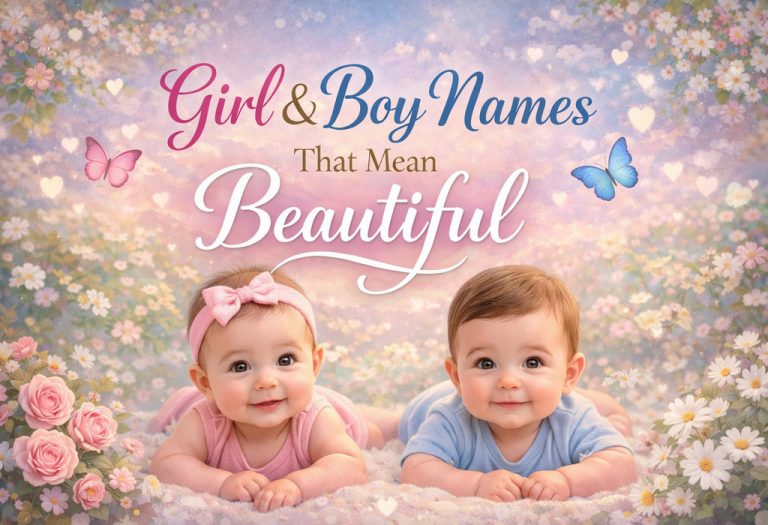20 Interesting Baby Welcoming Traditions From Around the World
Every culture has a distinct (and sometimes unbelievable!) way of celebrating the arrival of a new life. While in India, parents shave their baby’s hair, dab honey on his tongue, pierce his ears, and take him to their place of worship, new parents in other countries do things quite differently. Baby traditions around the world reveal a fascinating array of customs that reflect each culture’s beliefs, values, and unique approaches to nurturing their little ones. Now that we have your curiosity piqued let us tell you how people from different cultures welcome babies into the world and their homes, making each tradition a special part of the new parents’ journey.
Interesting Baby Traditions Observed Around the World
Across the globe, diverse cultures celebrate the arrival of new life through unique and often fascinating traditions. From naming ceremonies to rituals for protection, these birth traditions around the world offer a glimpse into the values and beliefs of different societies.
1. Leaving the Baby to Nap Outdoors in Freezing Temperatures – Denmark & Sweden
No, Danish and Swedish mothers aren’t stone-hearted! In Denmark and Sweden, they believe that exposing a baby to the local climate – be it summer or winter – will help him sleep better and feed more. So, parents leave their baby to nap on the balcony or sidewalk and enjoy some baby-free time in stores and cafes. Some parents, in fact, have baby alarms that alert them when their newborn has woken up so that they can go outside and bring him into the house!
2. Using the Maternity Package Gift From the Government – Finland
Finland is one of the few countries where the birth of babies is acknowledged and celebrated by the government. New mothers come home from the hospital to find a ‘maternity package’ left on their doorstep. The package is basically a starter kit that contains all the essentials the newborn would need – from clothes, diapers and sheets to toys; everything is there in the box! The government initially devised the ‘maternity package’ scheme, keeping low-income families in mind. But, it has been made available to all parents since 1949 so that every baby – rich or poor – can get an equal start in life. What’s best is that this care package is given not just to expectant mothers but also to adoptive parents!

Image Credit: Pinterest
3. Not Allowing the Baby’s Feet to Touch the Ground – Bali
Babies are no less than divine beings that have descended from heaven, the Balinese people believe. So, until 210 days from birth, parents don’t allow their baby’s feet to touch the ground. The little one receives the ultimate royal treatment and is not allowed to come in contact with the floor in any way. When his feet touch the ground for the first time, it’s believed that he has ‘crossed over’ to the other world and become human!
4. Giving Red-dyed Eggs as Return Gifts – China
In Chinese tradition, the birth of a baby isn’t celebrated right away. Instead, parents wait till their baby turns 1 month old to host a ‘Full Moon Ceremony’. This ceremony is attended by family and friends who come bearing gifts for the newborn and his parents. However, they don’t return empty-handed – the new parents give their guests red-dyed eggs in return. There are three reasons for this – red is believed to be a sign of happiness, the oval shape is symbolic of longevity, and the egg represents the changing process of life.

Image Credit: Pinterest
5. Burying the Placenta and Umbilical Cord – Jamaica
In Jamaica, the mother’s placenta (also known as afterbirth) and the baby’s umbilical cord are buried at a specific location in the house. Later, a tree is planted at that spot. The parents care for the tree until their baby grows up and starts tending to the tree by himself. This tradition is meant to teach the child to take responsibility in life.
6. Rocking the Baby in a Large Sieve – Egypt
Egyptian culture formally acknowledges babies only after they are a week old. On the 7th day of a baby’s life, his parents host a naming ceremony called Sebou. The baby is clothed in white robes and placed in a large sieve. Then, he is gently rocked back and forth. The Egyptians believe that doing this gets the baby accustomed to the vagaries of life. Next, he is laid on a blanket on the floor with a knife placed along his chest. The mother side-steps seven times over her baby to ward off evil spirits as the guests sing and shower the baby with grains, gifts and gold. They also light several candles and assign different names to them. The candle that burns the longest will decide the baby’s name.
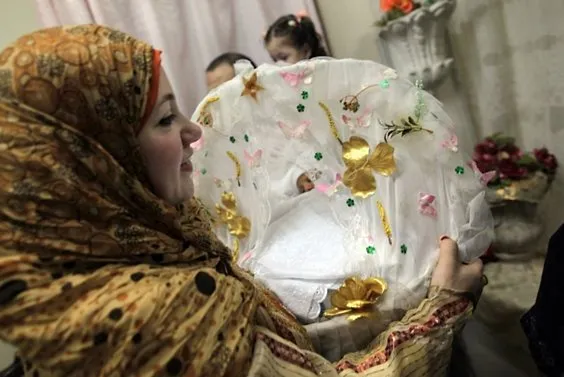
Image Credit: Pinterest
7. Symbolic Items Choosing Ceremony – Armenia
No parent wants to miss the chance to get a sneak peek into their child’s future. When an Armenian baby gets his first tooth, a ceremony called Agra Hadig takes place. Parents place their baby on the floor and surround him with a stethoscope, a tape measure, a screwdriver, a book and other symbolic objects. He is then encouraged to crawl towards the items and reach out to one of them. The object grabbed by the little one is believed to symbolise his future. For example, while a stethoscope is associated with medicine, a tape measure is associated with construction. Whether to take it seriously or not is up to the parents.
8. Full Body Exfoliation and Hot Stone Massage for New Moms – Malaysia
After birth, the person a baby needs most is his mother. Malaysian traditions recognise this and make efforts to help the new mom relax and recuperate from childbirth. For 44 days following the baby’s birth, a Malay mom undergoes a pantang (confinement) when she does nothing apart from nursing her baby. She is also given hot stone massages and a full body exfoliation treatment, which softens and lightens her skin, thus preserving her health and femininity. New moms are forbidden from lifting heavy things, and the household chores fall to the father, relatives, or a hired domestic help.
9. Giving the Baby Twenty Names – Nigeria
Babies born in Nigeria are blessed with certain elements on the seventh day (for a baby girl) and the ninth day (for a baby boy) of their birth. The infant’s lips are brushed with water, palm oil, bitter kola and salt and pepper. This is believed to ward off enemies and help the baby have a smooth and long life filled with happiness. Apart from the name chosen by the parent, the baby is given 20 other names that describe the circumstances of his birth. For example, if he has twin siblings, he would get the name Idowu, which means ‘child born after twins’. Often, parents come up with pet names like Ayoke, which means ‘one who is blessed’. Guests are also invited to name the baby, before which they have to place money in a basket. And that’s how Nigerian babies carry twenty names throughout their lives!
10. Souvenir Basket for Visitors – Brazil
In Brazil, the celebration begins in full swing even before the baby is born! Expecting moms prepare souvenir baskets which are later given to those who visit the mother and baby after delivery. The baskets usually contain candies, fridge magnets, customised notepads and even tiny bottles of perfume with the baby’s name on them. There’s also a message thanking the person for visiting. Such a sweet gesture, don’t you think?

Image Credit: Pinterest
11. Shoving the Baby Into Chilled Water – Guatemala
In tropical countries like Guatemala, people believe that an ice bath does wonders for the baby. Hence, every new mom soaks her infant in chilly water and turns a blind eye if he starts crying. A popular belief among the Mayans is that the baby sleeps soundly after an ice bath. We don’t know whether that’s true, but old midwives say that it cures the baby’s heat rash.
12. Slaughtering a Sheep – Islamic countries
In Islamic culture, the birth of a baby is celebrated by sacrificing an animal, such as a goat or sheep. This is called Aqiqah and believed to be an important ritual. Some families themselves slaughter the sacrificial animal while others bring home meat and cook up a feast. Once the food is prepared, it is divided into three portions – one for the immediate family, one for relatives and friends and one for the poor.

Image Credit: Pinterest
13. Salt Bathing Newborns – Turkey
In Turkish culture, newborns are given a bath that includes salt to symbolize purity and strength. The salt is believed to help protect the baby from illness and ensure they grow up with strong morals and character. It is a way of safeguarding the newborn’s health and future behavior.
14. The “First Haircut” Ceremony – Mongolia
In Mongolia, a child’s first haircut is a significant tradition, usually occurring between the ages of 2 and 5. Friends and family gather to participate, each taking a small snip of the child’s hair. The cut hair is often kept as a keepsake. This ceremony is meant to symbolize a new stage of the child’s life.
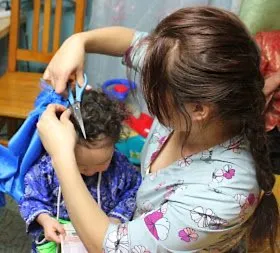
Image Credit: Pinterest
15. Wrapping the Baby in Cloth to Ward Off Evil – Ghana
In Ghana, babies are often wrapped tightly in specific kinds of cloth, known as kente, which is thought to protect them from evil spirits. The fabric is adorned with traditional symbols that convey blessings, strength, and protection.
16. Presenting Babies with Jewelry – Ethiopia
In Ethiopia, it is customary for newborns to be gifted jewelry, such as silver or gold bracelets and necklaces, to protect them from harm. These pieces are often blessed by a priest and worn by the baby to fend off evil spirits and negative energies.
17. Smudging the Baby with Sacred Smoke – Indigenous Tribes of North America
In many Indigenous cultures of North America, a smudging ceremony is performed to cleanse and bless the newborn. The baby is gently passed through the smoke of burning sacred herbs, like sage or sweetgrass, to protect them from negative energies and bring positive spirits into their life.
18. Placing Butter on the Baby’s Head – Tibet
In Tibet, newborns are welcomed with a ceremony called Lha Bab, where family members place a small amount of butter on the baby’s forehead as a blessing. This is meant to symbolise a bright future filled with wisdom and good fortune. The butter is considered sacred and is believed to bring protection.
19. Throwing the Baby Teeth onto the Roof – Japan
In Japan, when a child loses their first tooth, the custom is to throw the tooth onto the roof if it’s a lower tooth or into the ground if it’s an upper tooth. This tradition is believed to ensure that the new tooth will grow strong and straight.
20. Stretching the Baby’s Limbs – Kenya (Maasai Tribe)
Among the Maasai tribe in Kenya, elders gently stretch a newborn’s limbs as part of a ritual to ensure the baby grows strong and tall. This practice is done with care and is believed to promote good health and resilience in the child’s physical development.
FAQs
1. How do baby welcoming traditions vary between urban and rural areas?
In many cultures, urban areas may adopt modernised or simplified versions of traditional rituals influenced by contemporary lifestyles, while rural areas often preserve more traditional practices that emphasise communal participation and cultural continuity. This variation can reflect differences in resources, beliefs, and community ties.
2. Are there any baby-welcoming traditions that focus on environmental elements?
Yes, some cultures incorporate environmental elements into their baby-welcoming traditions. For instance, in certain Indigenous cultures, rituals may involve planting a tree to symbolise the child’s growth and connection to nature, emphasizing the importance of environmental stewardship and harmony with the earth.
Every culture treats babies like little kings and queens, and why not – these tiny divine beings need all the love and attention they can get! Which of the above traditions surprised and shocked you the most? Tell us in the comments!
Also Read:
Annaprashan Ceremony
Best Naming Ceremony Ideas
How to Do Naming Ceremony of Your Baby
Captions for a Newborn Baby Boy & Girl
Thoughtful Ideas for Welcoming Newborn Baby at Home
Was This Article Helpful?
Parenting is a huge responsibility, for you as a caregiver, but also for us as a parenting content platform. We understand that and take our responsibility of creating credible content seriously. FirstCry Parenting articles are written and published only after extensive research using factually sound references to deliver quality content that is accurate, validated by experts, and completely reliable. To understand how we go about creating content that is credible, read our editorial policy here.





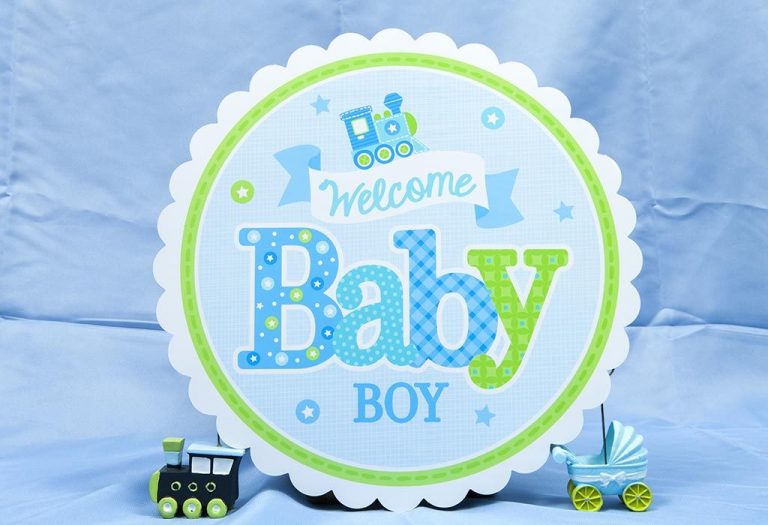
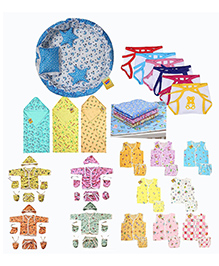





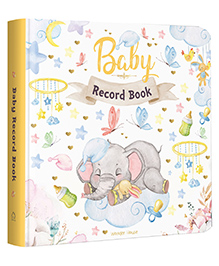








.svg)










